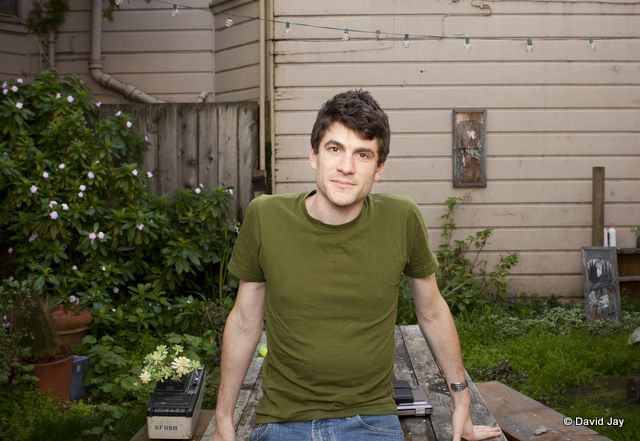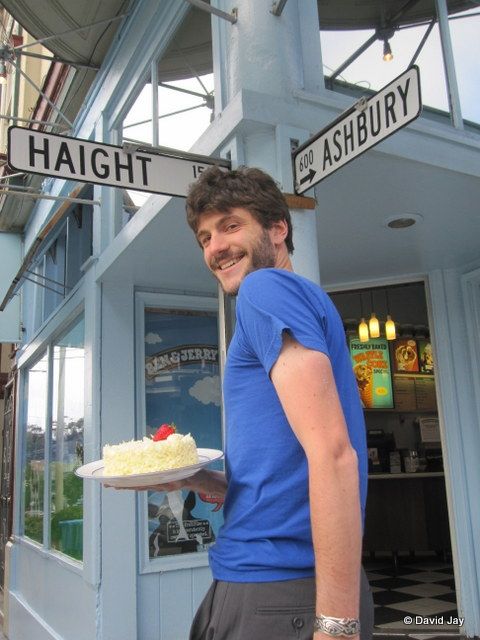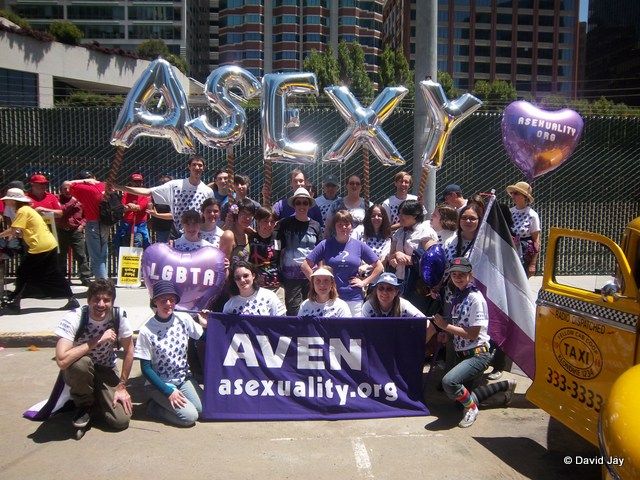Last-Minute NYC Holiday Gift Guide 🎁
We’ve created a holiday gift guide with presents for the intrepid New Yorker that should arrive just in time—



San Francisco is a town that celebrates people in all their quirky, peculiar, and eccentric forms. The Urban Profile column tells the stories of the colorful characters that make San Francisco–well, San Francisco.
David Jay, or DJ as he likes to call himself, looks much like your typical Mission hipster — tall, brown-haired, on wheels. He’s a good looking guy, and I notice one or two heads turn as he bounds into the coffee shop for our interview. “I’m so sorry I’m late,” he murmurs, flashing a disarming smile. Studying his profile as I buy him a cup of coffee I’m reminded of Rock Hudson, with a twist of Topher Grace from That 70s Show. DJ has the kind of looks and demeanor that would turn heads, start bar fights and generate cat-calling from Castro gays and Marina girls alike.
But DJ wouldn’t be interested in any of that. He is an asexual, an individual who does not experience sexual attraction. He doesn’t think about sex, he doesn’t want sex and thinks that life is perfectly great without it. It is estimated that approximately one percent of the world identifies as asexual, and a large number of whom interact with each other on the Asexuality Visibility and Education Network (AVEN) website and forums, a community DJ founded to bring the asexual community together and put the asexual orientation on the map.
In this issue of Urban Profile, I talk to San Francisco-based DJ, the face of the global asexual community, about growing up asexual, his first and only sexual relationship (and how that was a bust), and what it means to love without sex.
DJ realized he was not interested in sex at the terrifyingly awkward age of 14. He spent high school feeling like an outsider and wondering what was wrong with him. In the midst of avid teenage discussions about who is “hot” versus who is not, DJ, as an asexual, had nothing to contribute. The onslaught of awkward conversations about sex and adulthood from parents, teachers and other well-meaning adults began to stream in and DJ felt more and more isolated.
“Everyone was telling me sex was going to be a really essential part of my evolution into adulthood. Sex was supposed to be the beginning of how I would connect with people. All the images around me of people not being sexual were of people who were broken — people who couldn’t get laid, or people who had psychological conditions, or were depressed. And so I assumed that because I wasn’t experiencing a great sexual awakening, that I too was broken.”
As demoralizing as this sounds, it is unsurprising. In a world dominated by sex and sexualization, DJ’s casual admittance that sex is not anywhere near his list of top priorities is shocking to many. Coming out as an asexual invariably raises a few knee-jerk questions: are you just repressed? Are you secretly gay? Were you abused?
While his parents are understanding (DJ came out to them in his freshman year of college), a lot of people, especially straight women, view DJ’s asexuality as both a threat, and in some cases, a challenge to overcome. It is not uncommon for people to assume that he simply needs the “right” relationship to summon sexual interest.
In 2006 DJ was invited to a panel with the ladies of ABC’s The View. In the clip embedded below, one of the screeching middle aged hosts, Joy Behar, tried her very best to eviscerate him.
“Is it [asexuality] a problem?”
“If you’re not having sex what is there to talk about? I don’t understand.”
“Maybe it’s just repressed sexuality.”
“Do you have sex with yourself?”
“Are you just too lazy?”
Despite the fact that asexuals do not experience sexual desire, the human desire for partnership, relationships and human companionship is strong. While sex is of course only one part of meaningful relationship, in a world that views sex as an indispensable part of the relationship equation, asexuals are often left to conclude that if they don’t have sex, they cannot be in a relationship. Naturally, loneliness is a recurrent issue for asexuals who, before online forums like AVEN existed, often wondered if they were the only person in the world who did not experience sexual attraction.
DJ himself is in a romantic relationship with another asexual person, or ace, for short. He says she is “asexy,” an adjective used to describe an asexual person showing intelligence, confidence, style, physical attractiveness and a charming personality. His eyes sparkle when he talks about her.
“She is really emotionally open and rich and caring. After we met, we realized we had found a dynamic that we are looking for in our lives and we wanted to explore it.”
It was the most intellectual way I had heard a woman described, and yet somehow so romantic.

Like most asexuals, DJ craves intimate, physical touching that is distinctly non-sexual. He loves cuddling, specifically what he calls the “high-energy back touch,” which is really scratching on the back. He describes the mechanics of touching and cuddling for asexuals.
“For sexual folks, when things get more energetic and frantic like it does with back touching and scratching, it is moving towards sex. However in the asexual world, because there is no sex, when things get more energetic, it isn’t really moving anywhere and isn’t culminating in a sexual act. So if you don’t pay attention, the cuddling can go on for six hours and you don’t get any sleep. There is no natural conclusion point.”
Even though DJ is now in a fulfilling relationship with a fellow asexual, he has experimented with sexuality before, which he tells me is common in the asexual community. While sex isn’t something an asexual is drawn to, it is something he or she could be willing to compromise on, and engage in, for the sake of a strong, intimate relationship.
Kind of like the way my long-suffering boyfriend endures weekend marathons of Bravo’s Real Housewives of Atlanta with me? Exactly, he says.

Given that it isn’t his favorite way to pass time, what would drive DJ through down the rabbit hole of sex?
“At one point, I thought the only way to get a partner would be to have a relationship with a sexual person. And since I don’t desire sex, I had no way of consenting, so I made a long checklist of things that need to be true in a relationship before I experiment with sexuality. A year later, I found myself in a relationship where all those conditions were met so I said, okay, put on my waders and went in.”
Considering he described becoming sexual as “putting on waders” I asked if the sex was weird.
“It felt like an out-of-body experience. It was intellectually fascinating and really alien.”
Well that didn’t work out, I laugh. He smiles in that disarming way again. “Sex is not my thing.”
So where does the asexuality movement and the community he has built go from here? DJ tells me there is far more work to be done. The movement is becoming more global and he continues his community building work, training other young asexuals worldwide to be spokespeople and bring more awareness to the community.
DJ is also passionate about changing the way asexuality is defined in the medical community. Despite being identified as a sexual orientation by academicians and AVEN, asexuality is currently listed in medical journals as the mental disorder “hypo-active desire disorder,” something that DJ and AVEN are battling hard against. He also wants to alter existing frameworks of mental health. Think about it — a key step that mental health professionals look for in the recovery process is to find a way for the patient to be able to date and be sexual, which excludes the possibility that a patient may be asexual.
All said and done though, DJ’s ultimate bucket list goal is much less lofty.
“I want to compete in a dance-off with Mark Zuckerberg. It would be so awkward and so much fun.”
Now that’s sexy.
Get in touch with the author @mmmagpie.
Subscribe to our newsletter